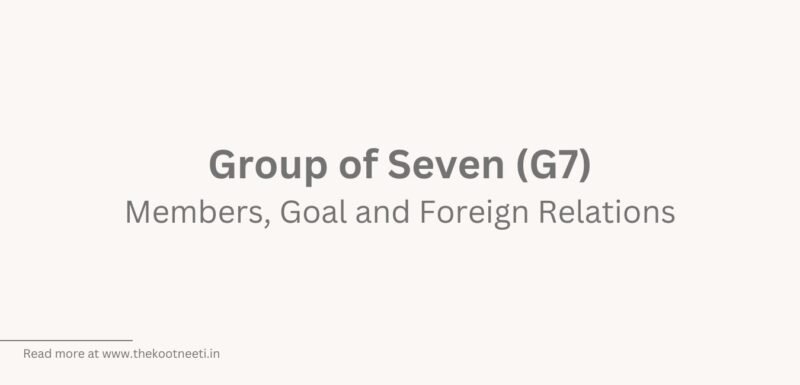Group of Seven (G7): Members, Goals and Foreign Relations

The Group of Seven (G7) is an informal forum of seven industrialized countries: Canada, France, Germany, Italy, Japan, the United Kingdom, and the United States. The G7 was founded in 1975 as the Group of Six (G6) to coordinate economic and monetary policy among the six major industrialized countries. Canada was later added to the group in 1976, and the name was changed to the G7.
The G7 countries are some of the most economically advanced and influential countries in the world, and the group is often seen as a forum for the coordination of global economic policy and for the promotion of international cooperation. The G7 holds annual summits, at which the leaders of the member countries meet to discuss a range of global issues, including economic growth, trade, development, and security.
The G7 has been criticized for its lack of representation, as it does not include many of the major emerging economies, such as China, India, and Brazil. Some have argued that the G7 is no longer an effective forum for addressing global economic issues, and that it should be expanded or replaced by a more representative group.
Goal of G7
The main goal of the G7 is to promote cooperation and coordination among its member countries on issues of global economic and political importance. The G7 holds annual meetings of its heads of state and government, as well as meetings of finance ministers and central bank governors. These meetings provide an opportunity for the G7 countries to discuss and coordinate their policies on issues such as trade, development, climate change, and security.
In addition to its annual meetings, the G7 also has a number of working groups and committees that focus on specific issues. These working groups bring together experts from the G7 countries to discuss and develop recommendations on issues such as energy, health, and food security.
Overall, the goal of the G7 is to promote cooperation and coordination among its member countries in order to address global challenges and promote stability and prosperity.
Why Russia is not in G7?
Russia was a member of the Group of Seven (G7) from 1998 to 2014, when it was suspended from the group following Russia’s annexation of Crimea and the conflict in eastern Ukraine. Prior to its suspension, Russia had been invited to join the G7 as a way to promote cooperation with the major industrialized countries and to encourage Russia’s integration into the global economy.
Russia’s suspension from the G7 was seen as a response to Russia’s actions in Ukraine and as a way to signal the G7’s disapproval of these actions. Russia has not been invited to participate in G7 meetings since its suspension, and it is not currently a member of the group.
Some have argued that Russia’s exclusion from the G7 has limited the group’s ability to address global issues and to engage with Russia on important economic and political matters. Others have argued that Russia’s suspension was necessary in order to send a strong message about the G7’s commitment to upholding international laws and norms.
India and G7 relations
India is not a member of the G7, but it has interacted with the group on a number of issues, including trade, development, and security.
India has participated in a number of G7-led initiatives, including the Global Partnership for Education and the G7 Health Ministers Meeting. It has also engaged with the G7 on issues such as climate change and the Sustainable Development Goals.
India has sought to deepen its relationship with the G7, and has sought to participate in G7 meetings as a guest on a number of occasions. However, India’s inclusion in the G7 has been controversial, as some have argued that it would dilute the group’s influence or that India is not sufficiently aligned with the values and priorities of the G7 countries.



















